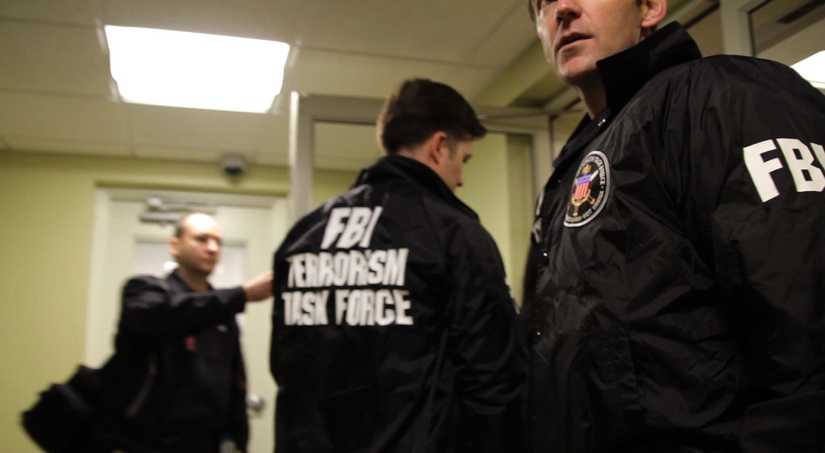In Lyric R. Cabral and David Felix Sutcliffe’s documentary (T)ERROR, good counterterrorism intelligence seems to be a secondary worry for Shariff. He’s 63 years old, he’s an ex-con, he’s been an FBI informant for decades, and, most importantly, he has bills to pay. That’s always in the back of his mind—he does this because he needs the work, and he’ll do whatever he has to in order to keep getting work. The gigs involve glad-handing his way into Muslim communities, getting to know a person of interest, and trying to get that POI to incriminate himself so the FBI can do the rest.
Nevermind the actual motives of the POI, in this case a Muslim convert named Khalifah Al-Akili. It’s all about the arrest. This is an operation of entrapment, pure and simple, but the FBI gets what the FBI wants. Shariff has no choice but to comply. When the film is fully in motion, (T)ERROR reveals the malleability of personal desperation and how government abuses are permissible under the shield of counterterrorism.
(T)ERROR
Directors: Lyric R. Cabral and David Felix Sutcliffe
Rating: N/A
Release Date: 4/16/2015 (Tribeca)
It’s not just desperation that drives Shariff. (T)ERROR looks back on the arrest and incarceration of Tarik Shah, a jazz musician that Shariff helped convict. When we learn more about Shah and what he said and the way that Shariff coaxed it out of him, we sense a fundamental sense of desperation driving Shah’s words. Even hypothetical allegiance to Al Qaeda is allegiance enough for arrest. The system isn’t just corrupt, it’s also absurd and is committed to keeping the poor and the marginalized down. Shariff used to be a black militant before the FBI gave him a chance to become an informant, and the cycle continues: marginalized groups used to incriminate and incarcerate other marginalized people.
In some ways, Shariff’s job is like high-pressure sales—he entices the desperate on the behalf of the FBI, trying to close the deal and get them to say something, anything, incriminating. If Shariff closes, there’s a chance he’ll get called on again by the FBI to close another deal and get paid. The camera hangs on Shariff, going in and out of focus in a stylized way, catching him around corners of a room like he’s the subject of some sort of surveillance. After a while, his quiet frustration reveals years of guilt. Maybe the camera is his conscience watching, judging. Shariff seems to know what he’s doing is awful, but sometimes, like Shah knew, a person has to do whatever it takes to pay the bills. Works for the man, gets paid by the man, but then has to pay the man back. And that cycle continues too.
There’s a small stretch of (T)ERROR that feels like it treads water, and while the material as a whole is engaging and important to explore, there’s a lack of forward movement near the middle. The Tribeca Film Festival cut of (T)ERROR clocked in at 84 minutes, which is about 10 minutes leaner than the original world premiere cut that played at Sundance. It’d be interesting to see if Cabral and Sutcliffe continue to carve just a few minutes from the front end of the movie as it plays more festivals or nears distribution of some kind.
That lag I mentioned doesn’t last too long, however, thanks to an unexpected shift in Cabral and Sutcliffe’s focus. They remain strong documentarians when the shift comes, but they become better documentary journalists. Not only do we understand Shariff, but Shah and Al-Akili too. It makes all the desperation more painful. (T)ERROR humanizes everyone involved in this deal. Except for the FBI, of course. They refused to be interviewed, possibly because they’d incriminate themselves further.


